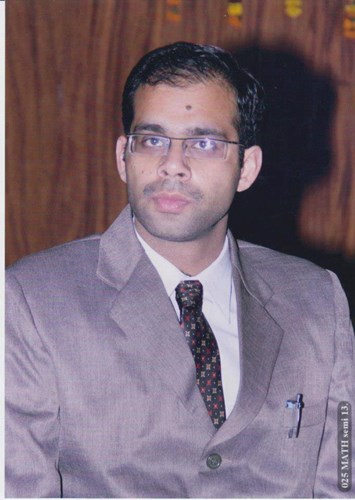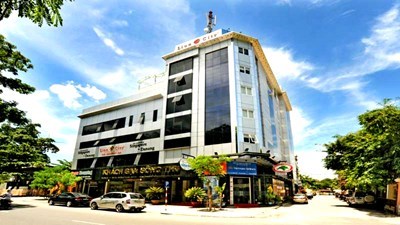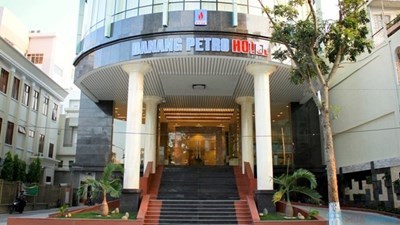
November 29th - 30th, 2018
THE 7TH INTERNATIONAL CONFERENCE ON FRONTIERS OF INTELLIGENT COMPUTING: THEORY AND APPLICATION (FICTA 2018)
Duy Tan University, Da Nang, Viet Nam
Address: Hall 613, 03 Quang Trung, Str
Call for Paper
The 7th International Conference On Frontiers Of Intelligent Computing: Theory And Application (FICTA 2018)
Read MoreImportant Dates

-
Conference Dates: November 29-30, 2018
-
Final paper submission and authors camera ready: 20th, November 2018
-
Notification of acceptance: 05th, November 2018
-
Paper submission: 23rd, October 2018
Special Session

-
Special Session on “Advances in Camera Based Document Recognition"
-
Special Session on “ Blockchain Technologies: Challenges, Solutions and Applications”
-
Special Session on “Emerging Trends in Cognitive Computing and Deep Learning (ETCDL)”
-
Special Session on “Emerging Trends & Technologies in Computing & Management"
-
Special Session on “Machine Learning and Artificial Intelligence in Financial Services, Agriculture”
-
Special Session on “Computational Intelligence in Biomedical Imaging (CIBI)”
-
Special Session on “Application of soft computing in software engineering: A Multidisciplinary Domains”
-
Special Session on “SCML18: Soft Computing and Machine Learning models for Bio-Medical Applications”
Keynote Speaker

Keynote 1: On the Load Balancing of Sensor Deployment for WSN
Prof. Sheng-Lung Peng
Department of Computer Science and Information Engineering at National Dong Hwa University, Taiwan
ABSTRACT
The Internet of things (IoT) is a network concept proposed for integrating physical devices, vehicles, home appliances, items embedded with electronics, and so on such that in IoT these device objects can connect and exchange data. On the other hand, a wireless sensor network (WSN) is a network formed by a large number of sensor nodes such that information obtained by sensors can be collected to a sink server for analysis. It is believed that WSN is a key technology for realizing IoT.
Deployment of sensor nodes, in particular, relay nodes or gateways, is an important issue in studying WSN. For example, clustering and area coverage on WSN are two extensively studied problems. Some balancing issues are also discussed in recent studies. In this talk, we consider a more general problem, namely, graph partitioning problem with load balancing issue. Note that sensors in WSN with their link abilities can define a graph. In this presentation, we will cover both algorithmic aspects and experimental studies for the problem. We hope this talk can trigger some ideas for audience to further study on this research topic.
BIOGRAPHY

Sheng-Lung Peng is a full Professor of the Department of Computer Science and Information Engineering at National Dong Hwa University, Taiwan. He received the BS degree in Mathematics from National Tsing Hua University, and the MS and PhD degrees in Computer Science and Information Engineering from the National Chung Cheng University and National Tsing Hua University, Taiwan, respectively. His research interests are in designing and analyzing algorithms for Bioinformatics, Combinatorics, Data Mining, and Networks.
Dr. Peng has edited several special issues for journals, such as Soft Computing, Journal of Internet Technology, Journal of Computers and MDPI Algorithms. He is also a reviewer for many journals such as IEEE Transactions on Emerging Topics in Computing, Theoretical Computer Science, Journal of Computer and System Sciences, Journal of Combinatorial Optimization, Journal of Modelling in Management, Soft Computing, Information Processing Letters, Discrete Mathematics, Discrete Applied Mathematics, Discussiones Mathematicae Graph Theory, and so on. He published more than 100 international conferences and journal papers.
Dr. Peng is now the Dean of the Library and Information Services Office of NDHU, an honorary Professor of Beijing Information Science and Technology University of China, and a visiting Professor of Ningxia Institute of Science and Technology of China. He is a director of Institute of Information and Computing Machinery (IICM), and of Taiwan Association of Cloud Computing (TACC) in Taiwan. He is also a supervisor of Chinese Information Literacy Association, of Association of Algorithms and Computation Theory (AACT), and of Interlibrary Cooperation Association in Taiwan. He has been serving as a secretary general of TACC from 2011 to 2015, of AACT from 2013 to 2016, and of IICM from 2015 to 2018. He was a convener of the East Region of Service Science Society of Taiwan from 2014 to 2016. He was also the regional director of the 2017 ACM-ICPC Contest Council for Taiwan.
=============================================================
Keynote 2: Modern to Future Scenario of Drones: Internet of Drone Things (IoDT)
Dr. Anand Nayyar
Duy Tan University, Da nang city, Viet Nam
ABSTRACT
Drones hover at the central intersection of the modern technological renaissance, allowing for new and imaginative application of Artificial Intelligence, Flight Technology, 3D Imaging and other burgeoning fields. These curious machines have an increasingly large presence in our anticipated future, bringing both incredible opportunities and new challenges. For humanitarian sector, they allow relief workers to be more informed, more effective and to access and solve complex real-time problems.
Drones already have a huge impact on our lives. For example, they are involved in producing our food: large, professional farms now routinely use drones to detect areas of weeds and poor yield that they need to target for herbicides and fertilisers. This saves farmers a lot of money and prevents them releasing unnecessary chemicals into the environment. Other uses include atmospheric research – to monitor pollution, the weather and climate, and in scientific studies that involve monitoring hazardous areas like volcanoes. They are also having an impact on popular culture; all the film companies use them now and the aerial shots you see in the latest films and TV programmes are captured by drones.
They have great potential; a step change would be the ability to operate drones safely in populated areas – delivering parcels, doing maintenance on buildings and filming events like the London Marathon. For this, drones need to be extremely reliable, so that if one of the rotors fails, it won’t fall into a crowd or road. Through our research, we are trying to understand why components of drones fail – for example whether it is vibration, heat or wear, so that we can build drones that can withstand these problems.
The Internet of Drone Things (IoDT) is regarded as next Future Envision of Smart Drones backend via Internet of Things. The utilization of drones in diverse fields is increasing from organizations to government agencies and from military to Agriculture. With IoDT based implementations, all the existing sectors become more intelligent and smarter with regard to Monitoring, surveillance, search and rescue and more.
BIOGRAPHY

Dr. Anand Nayyar (Academician, Researcher, Scientist, Author and Innovator) received his Ph.D degree in Computer Science from Desh Bhagat University, Mandi Gobindgarh, India. He is a Certified Professional with 75+ Certifications from top IT Giants- Microsoft, CISCO, EXIN, BeingCert, GAQM, Oracle, Cyberoam, Google and many more. He has published 250+ Research Papers, 18 Books and 50+ Articles on Open Source with various International Magazines. He is associated with more than 350 International Conferences as Technical Committee, Programme Committee and Session Chair Member. He has 12 Years of Teaching and Research Experience and currently associated with Graduate School, Duy Tan University as Lecturer, Researcher and Scientist. He has been awarded 25 Awards for Teaching and Research including Young Researcher, Young Achiever, Young Scientist, Exemplary Educationist, Distinguished Faculty and Best Scientist award to name a few. He is senior member of IEEE, ACM and even acting as ACM Distinguished Speaker. He is acting as Associate Editor for IJDST and IJISP. He has delivered 60+ Keynote Talks in various International Conferences and other IT events including Google I/O 2018 Mien Trung and FinTech 2018. He has been cited in Marquis Who’s Who in the World in 2014/2015/2016/2017/2018 and Rifacimento International: Reference Asia: Asia’s Who’s Who of Men and Women of Achievement 2013.
Submission

Submitted papers should not have been previously published nor be currently under consideration for publication elsewhere. All submissions will be thoroughly peer-reviewed by experts based on originality, significance and clarity. Only papers presenting novel research results or successful innovative applications will be considered for publication in the conference proceedings. Kindly ensure that your paper is formatted as per Springer AISC Template (not exceeding 10 pages written in A4 size - download here).
The papers can be submitted through easychair system: https://easychair.org/conferences/?conf=ficta2018
Registration

Registration Fee
| Academician/Researchers/Students (India and Vietnam): | USD 150 (Up to a max. page limit of 10 pages on Springer Template) |
|
| Academician/Researchers/Students: | USD 300 | |
| Extra page charges: | USD 50 (per page) | |
| Authors with multiple papers: (Up to 2 papers only) | Second and Third paper is USD 100 each |
Download Registration Form
Download Copyright Form
Kindly follow the below mentioned guidelines (strictly) related to preparation of final manuscript, copyright transfer form, registration/payment and final submission. The procedure has been detailed as a five step process (I)-(V):
(I) Preparation of CRC (Final Manuscript for Inclusion in Springer Proceedings Book) You are requested to give a strict attention to the below mentioned points during preparation of final manuscript to avoid any last minute revert backs from the publisher (Springer).
(a) Please format your paper on the springer template which may be download from our conference website.
(b) Authors should not mention designation etc. in the name and affiliation part below the paper title. You are requested to mention only name, college/organization name and mail ids of all the authors. However, they may mention acknowledgement if necessary (at the end of the paper-prior to references). Kindly mention full name of your institution and city name. Put a star mark on the mail id of corresponding author.
(c) Authors should not give any photo and biography at the end of the paper.
(d) Please address the comments raised by the reviewer(s) as far as practicable. The responsibility lies with the author to incorporate these comments in preparation of your final Camera Ready Copy (CRC) for submission. However, it is worth noting that your paper will not be reviewed again and the submitted CRC (after registration) will be directed to Springer for publication.
(e) In case there is any content matching issue that is communicated to you by review comments, kindly see that you rewrite the paper to avoid any plagiarism issue in future. While revising there may be possibility of adding few lines and sentences and it may change content overlap. Please be informed that Springer will not allow more than 15% overlap.
The sole responsibility for correctness of paper lies with the Author(s). Kindly ensure that while incorporating any changes to your paper you do not violate the Springer Plagiarism Policy. Please be informed that Editorial Board or Organizing Committee is not responsible if Springer finally rejects your paper even after you have registered due to plagiarism issue detected by Springer.
(f) Cite all figures and tables used in the body of the text. Check English sentences, grammars and spelling carefully. You are advised to take support from some expert on this.
(g) It is mandatory that the submitted manuscript is solely from the authors’ own work and not from the work of others (unless explicit permission for the same has been granted). This includes text, figures and tables. Information from published articles must always be cited explicitly. Proper citation is to give the credit to the work that is originally published (not to follow-up work or reviews).
(h) Citations should be given close to the information within the sentences or at the end of the sentence, not after several sentences or near the end of the paragraph. Even when citations are given, exact copying of a whole sentence or paragraphs should be indicated by quotation marks. Furthermore, reuse of part of a published figure or table requires a copyright permission from the publishers that hold the rights. All re-published figures and tables should explicitly indicate the original source.
(i) You have to doubly ensure the format of reference section as well as the mode of citations.
All references which are cited must be complete in terms of details like: Year of publication, Vol No, Issue No, pages, name of conference/journal etc. wherever required. [Refer detailed guidelines given in template itself]
All references listed in the end (under reference section) must be cited in the body of the text.
(j)Prepare your CRC (manuscript) using Springer template without containing any page numbers or any special headers or footers. From the final CRC formatted, authors should generate the electronic version of CRC in PDF format as well.
(k)You can add or delete authors name in your final paper. Once sent no further alteration will be possible.
(l) Please note that Springer will make a quality check of each final paper prior to sending it for production. If any issue of plagiarism is detected which is not within the Springer policy then the paper may be rejected even though authors might have registered. Neither the Editorial board nor the Organizing committee will be responsible in this case. Hence, we advise authors to carefully prepare their final paper.
(m) All Tables and equations in your final paper must be in editable format. No image format is acceptable.
(n) If you are revising your paper a lot as per the review comments please ensure that later Springer production quality team do not point out any issue of plagiarism later. Conf Organizer will do no further plagiarism check, hence all responsibility lies with author only.
(II) Completion/Filling of Copyright Form
(a) Copyright form may be downloaded from our conference web site. Use the copyright for applicable to you.
(b) Take a printout/soft-copy of appropriate Copyright form and kindly mention/enter the following:
Title of the Book or Conference Name: THE 7TH INTERNATIONAL CONFERENCE ON FRONTIERS OF INTELLIGENT COMPUTING: THEORY AND APPLICATION
(FICTA - 2018)
Volume Editor(s): Prof. Vikrant Bhatejay, et al.
Title of Contribution : Mention your complete paper title
Author(s): Mention the names of all the author(s) in the same order as mentioned in your paper.
Corresponding Author’s Name, Address, Affiliation and Email: The author signing the copyright form should mention his/her details: Full name, affiliation, complete postal address and e-mail id under this head.
(c) After making the above entries in the copyright form, it and can be signed by any one author (on the behalf of all the authors), i.e. the corresponding author and mention the date.
(d) Scan this completed and signed copyright form and convert it to pdf. (You can also use the facility of e-signature available in PDF)
(III) Author(s) Registration
(a) Each paper must be at least registered by one author for getting it published in Springer.
(b) Extra page length charges would be applicable beyond 10 pages (strictly). You have to make a combined fund transfer in such a case (i.e. Normal Registration + Extra Page Charges). For extra page charges kindly check conf web site for details.
(c) If same author is registering for multiple papers, the first paper is USD 150 and rest (only second and third paper) papers you have to pay USD 100 only . A single conference kit will be provided in such a case. [In case of Indian and Vietnamese authors only]
(d) For foreign authors/delegates the registration amount is USD 300, extra page charges 50 USD extra per page.
(e) You are requested to attend the conference and present your paper under the oral presentation session. If the registered/corresponding author is unable to attend the conference, the same can be attended and presented on his/her behalf by the co-authors. However, if none of the authors are able to attend the conference then it is mandatory that you should give us prior information and seek permission. In such case your registered paper will be forwarded for publication in Springer but it may be noted that presentation certificate will not be issued.
(f) The paper will not be uploaded to Springer unless we receive the payment.
(IV) Payments
Pay the conference registration fee in US Dollar($) via Bank Transfer (Please quote " FICTA-2018 Registration Fee, Your Name and Your Paper IDs" in the description section of your transfer) to:
- Bank name: Vietcombank Danang ( JOINT STOCK COMMERCIAL BANK FOR FOREIGN TRADE OF VIETNAM )
- Account holder: Duy Tan University
- Address: 254 Nguyen Van Linh str, Da Nang city, Viet Nam
- Account number: 004.1.37.001899.3D
- Swift code: BFTVVNVX 004
For the purpose of author/participant registration in FICTA-2018 conference; Authors/participants from Vietnam may use the following (alternative) to make payments directly in VND.
- Bank name: Vietcombank Đà Nẵng
- Account Name: Đại học Duy Tân
- Account Number: 004.1.000010792
In case of any difficulties contact Dr. Gia Nhu NGUYEN; Email: nguyengianhu@duytan.edu.vn
Mobile:+84-905155544; +84-901964444
After making the payment fill the registration form available on the conference website. Please send this completed registration form as well as scanned bank receipt by email to:
Dr. Gia Nhu NGUYEN
Email: nguyengianhu@duytan.edu.vn
And CC
Mr. Phan Phung HOI
Email: phanphunghoi@yahoo.com.vn
With the Subject Line of E-Mail: FICTA-2018 Registration Form
(V) Final Submission
Your final submission is the last step of registration/submission process. You are requested to submit the following files after renaming those with your paper id.
(a) Final camera ready paper in Springer format: pdf file.
(b) Final camera ready Springer format source paper: Either in WORD file or in LaTex (For latex, all the associated files should be given as zip file).
(c) Signed copyright form: scan copy jpg or pdf form.
(d) The proof of registration payment.
(e) Complete Registration Form
(f) Kindly rename all files with your PAPER ID (for example: 156_CRC.pdf, 156_CRC.docx, 156_Copyright.pdf, 156_Payment, 156_Reg_Form etc.).
(f) Store all files in a folder again named as your paper id and convert the same to zipped form.
(g) Forward this zipped folder to us as an attachment in ONE mail only
to: bhateja.vikrant@gmail.com
With your paper id in the subject column of the email (as: Final Submission 156)
Please complete the above process by or before 25th, October 2018
Send your final paper and registration as early as possible for allowing us to prepare the manuscript as soon as possible and send the same to Springer.
For any more queries, please feel free to call/email the Editor(s)
Thanking You
Warm Regards
Editors -2018
Corresponding Editor & Publication Chair-FICTA-2018
Prof. Vikrant Bhateja
E--Mail:bhateja.vikrant@gmail.com
Organizing Chair and Editor FICTA-2018
Dr. Nguyen Gia Nhu
Dean, Graduate School, Duy Tan University
254 Nguyen Van Linh, Da Nang, Viet Nam
Mobile: +84-905155544; +84-901964444
Email: nguyengianhu@duytan.edu.vn
Accommodation

List Hotels in Da Nang

Address: 30 - 34 Tran Phu, Hai Chau District, Da Nang
Tel: +84 - 511 - 3827666
Website: http://songthuhotel.vn

Address: 07 Quang Trung, Hai Chau District, Da Nang
Tel: +84 - 511- 3834834
Website: http://danangpetrohotel.com.vn/
Visa







